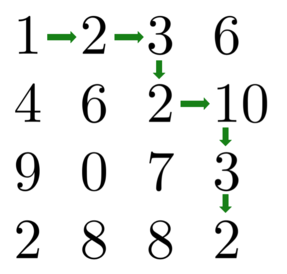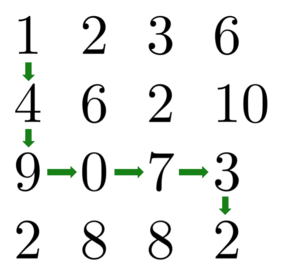CF1392E.Omkar and Duck
普及/提高-
通过率:0%
AC君温馨提醒
该题目为【codeforces】题库的题目,您提交的代码将被提交至codeforces进行远程评测,并由ACGO抓取测评结果后进行展示。由于远程测评的测评机由其他平台提供,我们无法保证该服务的稳定性,若提交后无反应,请等待一段时间后再进行重试。
题目描述
This is an interactive problem.
Omkar has just come across a duck! The duck is walking on a grid with n rows and n columns ( 2≤n≤25 ) so that the grid contains a total of n2 cells. Let's denote by (x,y) the cell in the x -th row from the top and the y -th column from the left. Right now, the duck is at the cell (1,1) (the cell in the top left corner) and would like to reach the cell (n,n) (the cell in the bottom right corner) by moving either down 1 cell or to the right 1 cell each second.
Since Omkar thinks ducks are fun, he wants to play a game with you based on the movement of the duck. First, for each cell (x,y) in the grid, you will tell Omkar a nonnegative integer ax,y not exceeding 1016 , and Omkar will then put ax,y uninteresting problems in the cell (x,y) . After that, the duck will start their journey from (1,1) to (n,n) . For each cell (x,y) that the duck crosses during their journey (including the cells (1,1) and (n,n) ), the duck will eat the ax,y uninteresting problems in that cell. Once the duck has completed their journey, Omkar will measure their mass to determine the total number k of uninteresting problems that the duck ate on their journey, and then tell you k .
Your challenge, given k , is to exactly reproduce the duck's path, i. e. to tell Omkar precisely which cells the duck crossed on their journey. To be sure of your mastery of this game, Omkar will have the duck complete q different journeys ( 1≤q≤103 ). Note that all journeys are independent: at the beginning of each journey, the cell (x,y) will still contain ax,y uninteresting tasks.
输入格式
无
输出格式
The interaction will begin with a line containing a single integer n ( 2≤n≤25 ), the amount of rows and columns in the grid. Read it.
Your program should then print n lines. The x -th line should contain n integers ax,1,ax,2,…,ax,n satisfying 0≤ax,y≤1016 , where ax,y is the amount of uninteresting problems Omkar should place in the cell (x,y) .
After that, you will first receive a single integer q , the amount of journeys that the duck will take. q queries will follow; each query will consist of a single line containing an integer k , the amount of uninteresting problems that the duck ate on that journey. After each query, given that you have determined that the duck visited the cells (x1,y1),(x2,y2),…,(x2n−1,y2n−1) in that order (it should always be true that (x1,y1)=(1,1) and (x2n−1,y2n−1)=(n,n) ), you should output 2n−1 lines so that the j -th line contains the two integers xj,yj .
Bear in mind that if the sum on your path is k , but your path is different from the actual hidden path, then your solution is still wrong!
After printing each line do not forget to output end of line and flush the output. Otherwise, you will get Idleness limit exceeded. To do this, use:
- fflush(stdout) or cout.flush() in C++;
- System.out.flush() in Java;
- flush(output) in Pascal;
- stdout.flush() in Python;
- see documentation for other languages.
Hack Format
To hack, first output a line containing n and another line containing q . It must be true that 2≤n≤25 and 1≤q≤1000 . Then, output the q journeys taken by the duck in the same format as described above: for each journey, given that the duck visited the cells (x1,y1),(x2,y2),…,(x2n−1,y2n−1) in that order, you should output 2n−1 lines so that the j -th line contains the two integers xj,yj . It must be true that (x1,y1)=(1,1) and (x2n−1,y2n−1)=(n,n) . Additionally, for each j such that 2≤j≤2n−1 , it must be true that 1≤xj,yj≤n and either (xj,yj)=(xj−1+1,yj−1) or (xj,yj)=(xj−1,yj−1+1) .
输入输出样例
输入#1
4 3 23 26 27
输出#1
1 2 3 6 4 6 2 10 9 0 7 3 2 8 8 2 1 1 1 2 1 3 2 3 2 4 3 4 4 4 1 1 2 1 3 1 3 2 3 3 3 4 4 4 1 1 1 2 1 3 1 4 2 4 3 4 4 4
说明/提示
The duck's three journeys are illustrated below.
1+2+3+2+10+3+2=23
 1+4+9+0+7+3+2=26
1+4+9+0+7+3+2=26
 1+2+3+6+10+3+2=27
1+2+3+6+10+3+2=27
